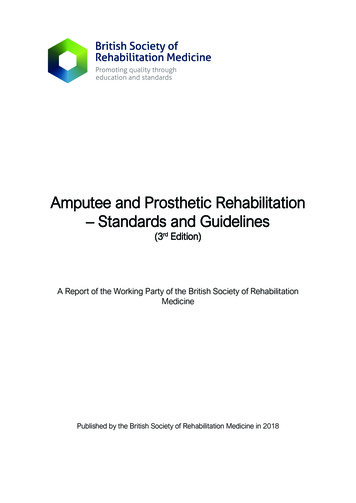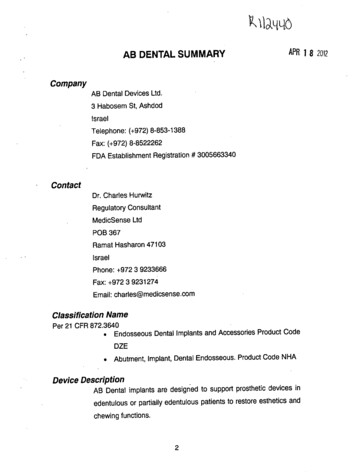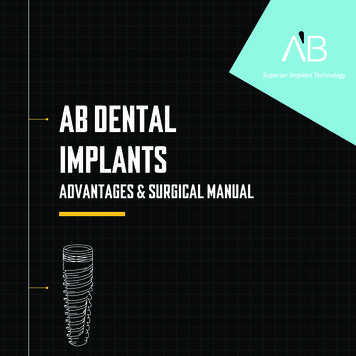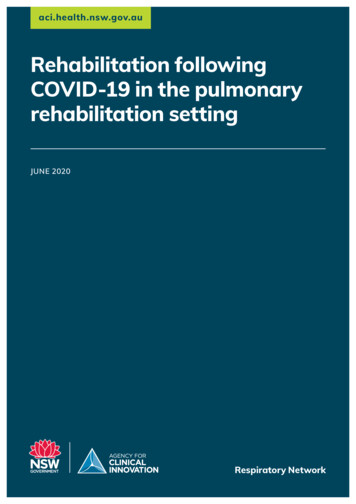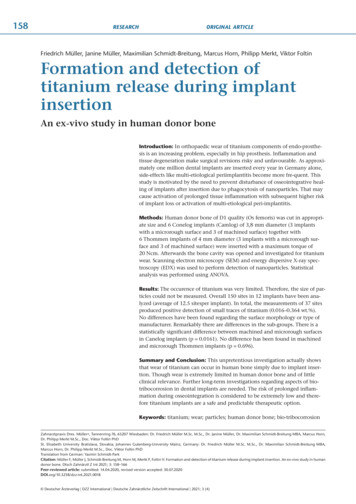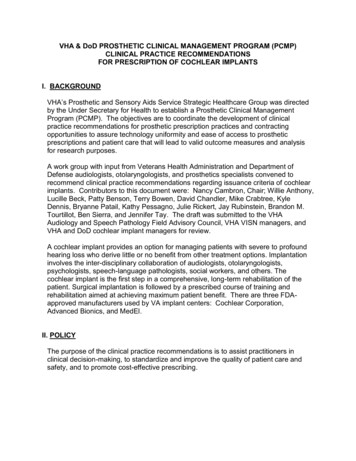
Transcription
VHA & DoD PROSTHETIC CLINICAL MANAGEMENT PROGRAM (PCMP)CLINICAL PRACTICE RECOMMENDATIONSFOR PRESCRIPTION OF COCHLEAR IMPLANTSI. BACKGROUNDVHA’s Prosthetic and Sensory Aids Service Strategic Healthcare Group was directedby the Under Secretary for Health to establish a Prosthetic Clinical ManagementProgram (PCMP). The objectives are to coordinate the development of clinicalpractice recommendations for prosthetic prescription practices and contractingopportunities to assure technology uniformity and ease of access to prostheticprescriptions and patient care that will lead to valid outcome measures and analysisfor research purposes.A work group with input from Veterans Health Administration and Department ofDefense audiologists, otolaryngologists, and prosthetics specialists convened torecommend clinical practice recommendations regarding issuance criteria of cochlearimplants. Contributors to this document were: Nancy Cambron, Chair; Willie Anthony,Lucille Beck, Patty Benson, Terry Bowen, David Chandler, Mike Crabtree, KyleDennis, Bryanne Patail, Kathy Pessagno, Julie Rickert, Jay Rubinstein, Brandon M.Tourtillot, Ben Sierra, and Jennifer Tay. The draft was submitted to the VHAAudiology and Speech Pathology Field Advisory Council, VHA VISN managers, andVHA and DoD cochlear implant managers for review.A cochlear implant provides an option for managing patients with severe to profoundhearing loss who derive little or no benefit from other treatment options. Implantationinvolves the inter-disciplinary collaboration of audiologists, otolaryngologists,psychologists, speech-language pathologists, social workers, and others. Thecochlear implant is the first step in a comprehensive, long-term rehabilitation of thepatient. Surgical implantation is followed by a prescribed course of training andrehabilitation aimed at achieving maximum patient benefit. There are three FDAapproved manufacturers used by VA implant centers: Cochlear Corporation,Advanced Bionics, and MedEl.II. POLICYThe purpose of the clinical practice recommendations is to assist practitioners inclinical decision-making, to standardize and improve the quality of patient care andsafety, and to promote cost-effective prescribing.
III. CANDIDACY GUIDELINES FOR ADULTS (AGE 18 YEARS AND OLDER)It is highly recommended that the following guidelines be met for an adult to beconsidered a candidate for a cochlear implant:A. General Criteria1. The cochlear implant must be medically necessary. The Cochlear Implant Teamdetermines medical necessity using current FDA guidelines, IRB-approved protocol,2. Veteran has the cognitive and emotional capacity to adapt to and benefit fromimplantation.3. Veteran displays reasonable and appropriate expectations of potential benefit.4. Veteran agrees to participate in the treatment and rehabilitative protocol.B. Medical Criteria1. No medical contraindications for anesthesia or surgery2. No active middle-ear infection3. No evidence of VIII nerve disease.4. CT scan or MRI demonstrating feasibility of implantation.5. Physicians should consider prophylactic perioperative antibiotic treatment.6. Cochlear implant candidates, as well as those already implanted, maybenefit from vaccinations against organisms that commonly cause bacterialmeningitis, particularly Streptococcus pneumoniae and Hemophilus influenza.Immunization status should be ascertained for all candidates before surgery.Vaccines are available against influenza and pneumococcal organisms in childrenand adults, but the effectiveness of such vaccines is not fully known.C. Audiologic Criteria1. Derives marginal benefits from conventional amplification2. Bilateral primarily sensori-neural severe to profound hearing loss3. Speech recognition ability for open-set speech meets FDA guidelines orIRB-approved protocol when veteran is fit with optimal amplification.
IV. CLINICAL PRACTICE RECOMMENDATIONS FOREVALUATION/IMPLANTATION/TRAININGA. Service DeliveryAll eligible veterans who meet selection criteria and demonstrate medicalnecessity will receive a cochlear implant. For the purposes of this ClinicalManagement Program, an eligible veteran is one who is enrolled for VA healthcare or is exempt from such enrollment (as defined in 38 CFR 17.36) andotherwise meets selection criteria.1. Selection criteria will conform to current FDA guidelines or IRBapproved protocol. Prior approvals by the CI Advisory Board and IRB locally arerequired for devices with an Investigational Device Exemption (IDE). Bilateralcochlear implants will be considered by the CI Advisory Board on a case-by-casebasis. Devices or protocols without IDE or FDA approval will not be considered.2. Medical necessity will exist when the selection criteria are met and theimplant team certifies that the patient is a candidate for a cochlear implant.3. VHA will establish Cochlear Implant Centers (CIC) according to sitecriteria. New sites must apply to the CI Advisory Board for approval.4. Facility Directors may elect to provide cochlear implant servicesthrough non-VA health care facilities provided they meet the site criteria.5. No veteran will be denied cochlear implant services because he/sheresides outside of the VISN of a designated Cochlear Implant Center or otherhealthcare entity contracted to provide cochlear implant services.6. The cochlear implant team, with input from the veteran, will determinewhich multi-channel device is most appropriate for each cochlear implantcandidate. It is recommended that two speech processors be provided for eachcochlear implant candidate.7. Cochlear implant recipients will return to the host site after the surgicalsite is well healed for activation of the cochlear implant and training. Initialactivation and training will require multiple visits. Follow-up appointments will bescheduled at regular intervals throughout the first year post-activation to addressprogramming changes and rehabilitation needs. Thereafter, cochlear implantrecipients will be followed annually, or on an as-needed basis, by either the hostsite or an approved contract facility. Audiologic rehabilitation will be provided asnecessary through clinic appointments and/or take-home materials.8. Batteries and repairs will be provided to cochlear implant users.
Replacement of speech processors will be provided if veteran demonstratesneed.B. Cochlear Implant Site Criteria1. Equipmenta. Sites must possess all standard audiometric equipment to performcomprehensive audiometric evaluations as well as acoustic immittance,auditory evoked potentials, and otoacoustic emissions (TransientOtoacoustic Emissions or Distortion-Product Otoacoustic Emissions).b. Sites will calibrate audiometric equipment bi-annually and perform listeningchecks daily.c. Sites will maintain calibration records. Sites will conform to applicableANSI standards.d. Sites must have equipment to perform speech identification tasks in soundfield.e. Sites must have at least one suitable sound-treated room that meetsapplicable ANSI and VHA specifications.f. Sites must have all specialized equipment for selecting, evaluating,programming, and activating implant devices and hearing aids.g. Sites must have test materials for evaluating implant candidates andoutcomes.2. Personnela. Each site must have at least one qualified audiologist on staff who isspecifically trained in cochlear implant management. An audiologist trained incochlear implant fittings is responsible for performing audiologicassessments, counseling the patient, programming the device afterimplantation, and providing extensive training and rehabilitation to the patient.This rehabilitation program is designed to produce maximum benefit from theimplant by integrating the auditory-electrical code with environmental, visual,and contextual cues.b. Cochlear implant audiologists will meet training requirements set forth bythe American Speech Language-Hearing Association or the AmericanAcademy of Audiology.c. Each site must have at least one qualified otolaryngologist on staff
or on contract who is experienced in the medical and surgical management ofcochlear implants. The cochlear implant otolaryngologist, a physician whospecializes in diseases of the ear, is responsible for the management ofmedical and surgical aspects of evaluation and treatment.d. The cochlear implant team is an inter-disciplinary group ofotolaryngologists, audiologists, and can include psychologists, speechlanguage pathologists, social workers, and others.Each site must demonstrate interdisciplinary collaboration of services such asSurgery, Medicine, Otolaryngology, Neurology, Psychology, Social Work,Speech-language Pathology, Radiology, and ancillary services.3. Training and Experiencea. The implant audiologist will have specialized training from themanufacturer in the evaluation, activation, and programming of the speechprocessor.b. The implant otolaryngologist will have specialized training from themanufacturer, or equivalent training during a neurotology fellowship, in theevaluation and implantation of the device.c. The audiologist will demonstrate not less than 1 CEU (10 contacthours) per year in cochlear implant management or related areas.d. Each implant audiologist and otolaryngologist will demonstrateinvolvement in at least ten (10) cochlear implants to be certified as an implantaudiologist and implant otolaryngologist respectively.4. Documentationa. Each site will maintain thorough medical documentation.b. Documentation includes but is not limited to: audiologic records, pertinentmedical, social and family histories, evaluations, communication scales andinventories, programming, training, progress notes, and outcomes.c. At minimum, each site will collect the following speech recognitionmeasures in quiet on each veteran:Preoperatively, the following sentence tests will be presented in sound fieldat 0 azimuth at a level of 70 dB SPL while the veteran is fit with optimalamplification: City University of New York sentences - 1 list per ear andbinaurally
Hearing in Noise Test sentences - 2 lists per ear andbinaurallyPostoperatively, the following sentence tests will be presented in soundfield at 0 azimuth at a level of 70 dB SPL while veteran is fit with best mapin speech processor: City University of New York sentences - 1 listHearing in Noise Test sentences - 2 listsThe postoperative testing will be conducted at six months post-activation &at annual evaluations.These measures are the minimum testing required for VHA reportingpurposes. Clinicians are encouraged to also test patients preoperativelyand postoperatively with monosyllabic words and sentences in noise.d. Each site will administer the Performance Inventory for Profound andSevere Loss (PIPSL) both preoperatively and at one year postoperatively aswell as other outcome measures as appropriate.e. Each site will enter speech recognition and outcomes data in the CochlearImplant Registry in ROES.f. Each site will order cochlear implants and replacement parts electronically.C. Cochlear Implant Advisory Board1. The Audiology and Speech Pathology Program Office will establish andoversee a Cochlear Implant Advisory Board.2. The purpose of the Cochlear Implant Advisory Board is to:a. Provide guidance to the National Director, Audiology and SpeechPathology Service, on current cochlear implant practices, selection criteria,and device standards.b. Monitor clinical practices and outcomes at implant sites. Determineapproval for new implant centers.c. Establish and maintain a cochlear implant registryd. Report periodically to the National Director on the status of theimplant program
3. The membership of the Cochlear Implant Advisory Board will be:a. Two audiologists with experience in cochlear implantsb. Two otolaryngologists with experience in cochlear implantsc. Director, Surgical Serviced. Director, Audiology and Speech Pathology Servicee. Representation from the Department of Defensef. Representation from Prosthetics and Sensory Aids Serviceg. Ad hoc, representatives from each cochlear implant siteD. Cost and Logistics1. For the purposes of this Clinical Practice Recommendation, the facilityreferring the implant candidate is the referring facility. The facility providing theimplant services is the host facility.2. The host facility is responsible for paying the cost of evaluation,implantation surgery, anesthesia, inpatient costs, ancillary services, otherservices that may be medically necessary for the management of the patient,follow-up evaluations, and other visits as may be required to ensure that thepatient obtains maximum benefit from the implant.3. Veterans will receive care from the VHA cochlear implant center orapproved contracted center nearest their home. For VHA patients, the referringfacility will pay for travel to the host facility and the host facility will pay for lodgingand return travel in accordance with VHA Policy on "travel and lodging forpatients, spouses and significant others”. Travel funding for DoD patients willfollow Joint Travel Regulation guidelines.4. The host facility is responsible for paying the cost of the implantdevice, accessories, repairs, and replacements. VHA cochlear implant centerswill receive funding for the implant devices from PSAS centralized funds.5. The cochlear implant manufacturer will provide two implants at time ofsurgery, the primary implant and one back-up implant. The back-up implant willbe provided at no extra charge if it is returned to the manufacturer followingsurgery.6. The host facility is responsible for coordinating all evaluations, tests,
surgical and radiological services, ancillary services, training sessions, and otherservices that are medically necessary. Where appropriate, the referring facilitymay provide initial evaluations, medical tests, audiologic tests, and radiologyexams as necessary to determine candidacy. However, the host facility isresponsible for evaluating the completeness or adequacy of clinical dataprovided by the referring facility.V. REFERENCESAmerican Academy of Audiology. (1997). Audiology: Scope of Practice.Audiology Today. Volume 9, Number 2, p. 12-13.American National Standards Institute. (1996). Specification for audiometers (ANSIS3.6 – 1996). New York.American Speech-Language-Hearing Association. (2004). Technical Report: CochlearImplants. ASHA Supplement 24, in press.Joint Audiology Committee on Clinical Practice. (1999). Clinical practice statementsand algorithms. Rockville, MD: American Speech-Language Hearing Association.CDC National Immunization Program http://www.cdc.gov/nip/Owens, E. and Raggio, M. (1988). Performance Inventory for Profound and SevereLoss (PIPSL). Journal of Speech and Hearing Disorders, 53, 42-56.Spitzer, Kessler, and Bromberg (1992). Longitudinal findings in quality of life andperception of handicap following cochlear implantation, Seminars in Hearing, 13 (3),260-270.Waltzman, Cohen, and Fisher. (1992). An experimental comparison of cochlear implantsystems, Seminars in Hearing, 13 (3), 195-207.
AddendumPEDIATRIC CANDIDACY GUIDELINES FOR DEPARTMENT OF DEFENSECENTERSIt is highly recommended that the criterion described below be met for all pediatricpatients being considered for cochlear implant candidacy.A. General Criteria1. The cochlear implant must be medically necessary. The Cochlear ImplantTeam determines medical necessity using current FDA guidelines, IRB-approvedprotocol,2. Candidate has the cognitive and emotional capacity to adapt to and benefitfrom implantation.3. Family and patient display reasonable and appropriate expectations of potentialbenefit.4.Family agrees to participate in the treatment and rehabilitative protocol.5. Candidates between the age of 12 months and 17 years.B. Medical Criteria1. No medical contraindications for anesthesia or surgery.2. No active middle-ear infection.3. No evidence of VIII nerve disease.4. CT scan or MRI demonstrating feasibility of implantation.5. Physicians should consider prophylactic preoperative antibiotic treatment.6. Cochlear implant candidates, as well as those already implanted, may benefitfrom vaccinations against organisms that commonly cause bacterial meningitis,particularly Streptococcus pneumoniae and Hemophilus influenza.Immunization status should be ascertained for all candidates before surgery.Vaccines are available against influenza and pneumococcal organisms inchildren and adults, but the effectiveness of such vaccines is not fully known.
C. Audiological Measures1. Audiometric testing under headphones if possible, Visually ReinforcedAudiometry (VRA), Acoustic Immittance.2. Auditory Brainstem Response (ABR) (Sedated if necessary to confirm hearingloss).3. Otoacoustic Emissions (OAEs).4. Soundfield testing unaided and in best aided condition.5. Speech perception testing when possible. The following tests arerecommended. However, other developmentally appropriate measures may benecessary, especially with multiply handicapped children.0-24 months Parental questionnairesi. Infant-Toddler Meaningful Auditory IntegrationScale (IT-MAIS)ii. Ling Schedule of Development2-4 years Infant-Toddler Meaningful Auditory Integration Scale (IT-MAIS), EarlySpeech Perception (ESP), LING Six Sound Test Multisyllabic Lexical Neighborhood Test (MLNT), Lexical NeighborhoodTest (LNT), Phonetically Balanced Kindergarten (PBK) Word List, GlenDonald Auditory Screening Procedure (GASP), Hearing in Noise Test forChildren (HINT-C)5 years Meaningful Auditory Integration Scale (MAIS), Early Speech Perception(ESP), Test of Auditory Comprehension (TAC), LING Six Sound Test,Pediatric Speech Intelligibility Test (PSI) Multisyllabic Lexical Neighborhood Test (MLNT), Lexical NeighborhoodTest (LNT), Phonetically Balanced Kindergarten (PBK) Word List,Hearing in Noise Test for Children (HINT-C), Glen Donald AuditoryScreening Procedure (GASP)D. Audiological Criteria1. Bilateral sensori-neural hearing loss (SNHL), primarily of severe to profoundseverity.2. 3-6 month Hearing Aid trial with no significant benefit (hearing aid trial can bewaived in cochlear ossification pathologies).
Upon conclusion of trial a re-assessment of speech/language milestonesis obtainedIf no improvement is noticed in the speech/language developmentmilestones, patient is considered a CI candidate.4. Age Based Criteria 4 years Multisyllabic Lexical Neighborhood Test word scores 20% Infant-Toddler Meaningful Auditory Integration Scale scores 2 onquestions 3,5,6 4 years Phonetically Balanced Kindergarten word list 0-12% Hearing in Noise Test for Children score 30%E. Cochlear Implant TeamAs a minimum the team should consist of the tolaryngologist/NeurotologistDevelopmental PediatricianEducational Specialist
cochlear implant is the first step in a comprehensive, long-term rehabilitation of the patient. Surgical implantation is followed by a prescribed course of training and rehabilitation aimed at achieving maximum patient benefit. There are three FDA-approved manufacturers used by VA implant centers: Cochlear Corporation, Advanced Bionics, and MedEl.


